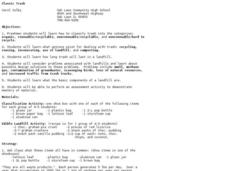Curated OER
Life And Death
Students participate in an interactive game to review how living things are classified.
Curated OER
Classic Trash
Students investigate how trash is classified and the options to deal with it. In this trash and recycling instructional activity, students perform an activity to classify trash into organic, renewable/ recyclable, now...
Curated OER
Forest Food Chains and Webs
Students explore forest ecological systems. In this ecology lesson plan, students classify forest plants and animals according to their ecological roles. Students play a related vocabulary guessing game. Students choose a card on which...
Curated OER
Classification and Identification
Young scholars, after exploring and analyzing diagrammatic and taxonomic keys and their association to marine sciences, identify and classify objects and organisms based on visual attributes/characteristics. They research and create...
Curated OER
Life in a Forest Stream
Students assess macro-invertebrates from a stream. In this science lesson plan, students observe, classify and identify organisms found in a stream. A lab station is constructed at the stream sight and students study the different...
Curated OER
Personal Learning Profile Project
Young scholars take notes on a prepared advanced organizer. They analyze dreams and goals across many parts of life and create different types (paths) of goals to accomplish dreams. They classify dreams and goals generated across...
Curated OER
Testing for Chemicals in Soils
Learners use sight, touch and chemical test kits to evaluate and classify soil types. They determine the organic content, soil pH, conduct visual analysis and nutrient tests of a variety of soil samples from various sources.
Curated OER
Classification of Cerealites
Students create a dichotomous key. In this categorizing lesson, students create a dichotomous key for different types of cereal. Students classify the cereal into groups such as flakes and cereal with holes. Students discuss their...
Curated OER
What's in a Name?
Students study the binomial system of naming organisms. They are given a name of an organism and they must draw a picture of what they think the organism looks like. Then they research the organism, find what it really looks like, and...
Curated OER
Through the Eyes of an Owl
Students describe vertebrates in terms of observable body parts and characteristics and describe life cycles of familiar organisms. They identify familiar organisms as part of a food chain or food web and describe their feeding...
Curated OER
Organizing Life
In this taxonomy worksheet, students learn about Linnaeus' system for classifying living things. Students complete 2 fill in the blank and 2 short answer questions based on what they read.
Curated OER
What's Your Genus? Scientific Classification and the VT
Students learn about binomial nomenclature, the scientific system of classification. In this scientific classification lesson, students work cooperatively to complete a binomial scavenger hunt using the internet and a Visual Thesaurus....
Curated OER
Focus on Food Chains
Third graders collect and analyze data about food chains. They conduct Internet research about the habitat of a selected organism, write a narrative, and create a computer slideshow using Kid Pix computer software that illustrates the...
Curated OER
The Circle of Life
Fourth graders examine how the different organisms living in an ecosystem affect one another. In groups, they research a specific ecosystem and present their findings to the class based on the type of organisms found in it. To end the...
Curated OER
Ecosystems of the World
Students are able to list different ecosystems and describe their environment and organisms. They have an understanding about the function and balance of the ecosystems. Students are able to tell what type of ecosystem the St. Mary's...
Curated OER
Animals, Soil, Trees
Fourth graders describe the various kinds of soils and how plants and animals are affected by them. They describe the baic needs of plants, scoring at least a 3 or 4 on a 4-point rubic. Students are able to predict and/or infer what...
Curated OER
Paint's Family Tree
Students sort and classify the genetic traits of horses. In this heredity and genetics lesson, students read dialogue in a skit in which specific physical traits of several horses are described and a horse family tree is created....
Curated OER
Worm Family Needs A New Home
Young scholars examine different types of soil. In this soil lesson, students research different types of soil. Young scholars create a podcast about a worm family looking for a new home using storyboarding or graphic organizers.
Curated OER
What's Your Classification
Students classify animals. In this animal groups lesson, students watch a video on animal groups and review the six animal groups. Students practice classifying animals using stuffed animals.
Curated OER
What's Your Genus? Scientific Classification and the VT
Students understand the definition of binomial nomenclature. In this binomial nomenclature lesson, students classify ordinary animals by seeking their scientific names. Students participate in a knowledge hunt using binomial nomenclature.
Curated OER
Seeds of Wetland Life
Students participate in several activities on seed exploration. In this biology lesson, students classify seeds according to their dispersal method. They explain the different adaptations plant have to disperse their seeds.
Curated OER
Animal Slideshow
Second graders view animal fact sheets, and make a slide about an animal. In this animal classification lesson, 2nd graders list facts that help classify the animal. Students use Microsoft paint and color their animal. Students use the...
Curated OER
INSECT TAXONOMY VIA THE INTERNET
Seventh graders explore how to classify insects and organize information.In this insect classification lesson students use the Internet to retrieve information on insects then organize the pictures to make a book project.
Curated OER
Emergency Preparedness
Learners are introduced to governmental and humanitarian responses to disasters. They research organizations such as FEMA and the Red Cross. They examine their local National Guard unit as well.

























